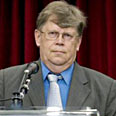

The UN nuclear watchdog agency said Tuesday it will send a team of inspectors early next week to a disputed Iranian heavy water reactor - a key step in efforts to allay lingering concerns over the country's nuclear program.
Olli Heinonen, deputy director-general of the International Atomic Energy Agency, told reporters after meeting with a delegation from Iran that the team planned to head to the complex under construction outside the industrial city of Arak next Monday or Tuesday.
Arak will produce plutonium once it is completed sometime in the next decade, and the UN Security Council has demanded that Iran stop construction.
IAEA experts say access to the research reactor is key to their review of Tehran's nuclear activities.
Iran insists its nuclear program is peaceful and geared solely toward producing electricity. The United States and key Western allies accuse it of covertly trying to build a nuclear weapon.
Iranian officials and Heinonen agreed earlier this month that agency inspectors would visit the Arak reactor by the end of July. That concession follows an Iranian ban on such visits imposed earlier this year.
Tehran asserts it is building the Arak reactor for research and medical purposes, and not for its plutonium
capabilities.
Javad Vaeedi, Iran's deputy nuclear negotiator, described Tuesday's talks at the agency's headquarters in Vienna as "a good discussion," and Heinonen said both sides agreed to keep talking over the next few weeks.
IAEA chief Mohamed ElBaradei said earlier this month that Iran has scaled back its uranium enrichment program, suggesting there was a new willingness from the government to resolve the international deadlock over its nuclear stance. On Monday, Britain predicted tougher UN sanctions if Tehran does not halt enrichment.
UK: Tougher sanctions against Iran likely
The IAEA said Tuesday's talks were an attempt to clarify "the open issues associated with the scope and content of Iran's enrichment program."
Iran's refusal to cooperate and allow inspectors to return to facilities like Arak prompted the Security Council to become involved last year. It has imposed two sets of sanctions on Iran over the nuclear standoff.
On Monday, British Prime Minister Gordon Brown said tougher sanctions against Iran were likely and declined to reject outright the prospect of military action. Brown said he believed sanctions aimed at persuading Iran to halt uranium enrichment were working, but predicted a swift new Security Council resolution aimed at increasing pressure on Iranian President Mahmoud Ahmadinejad.
He said Britain would "take whatever measures are necessary to strengthen the sanctions regime in the
future."
Enrichment can produce both fuel for a reactor and - if the material is enriched to a high level - the core for a nuclear warhead.
Iran's Foreign Ministry said Sunday that Tehran will continue pursuing its disputed nuclear program and hopes the Security Council will not sanction it for refusing to suspend enrichment.















